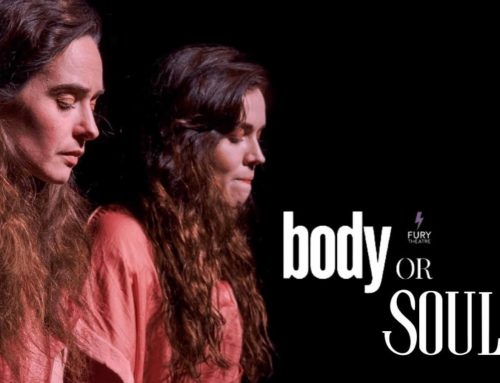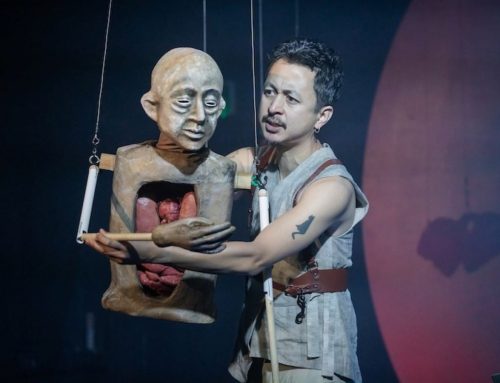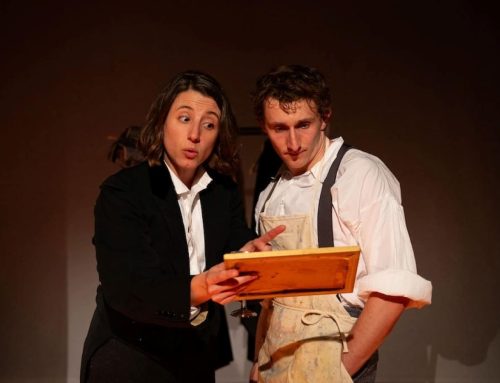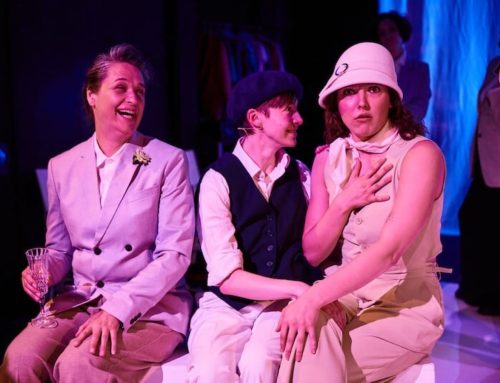Writer and performer Alfie Webster uses only lower case for the eponymous protagonist of his striking, emotionally resonant and beautifully layered single-hander lenny. It is an apposite choice for a character who feels himself to be small and insignificant, not a fully individuated person, but somehow diminished or half-formed. He calls himself “little lenny” because, crushed by anxiety, self-doubt, and an overwhelming lack of self-esteem, that is how he sees himself. The irony is that physically, lenny is portrayed as a great hulk of a bloke: a lumbering 29-year-old London man-baby in a lime green puffer jacket and bold yellow shorts. Think a bulky gay Peter Pan crossed with an anxiety-prone Forrest Gump. Even his Scottish wannabe love interest calls him “big man”.
In the posh, arty cinema where he works, little lenny disappears into the movies, finding refuge in the darkness, the stories, and the “black box” of the projection room. Mia Houghton’s set (beautifully lit by Gabriel Finn), a white square cube with a recessed centre rectangle, cleverly evokes the cinema milieu. Raffaela Pancucci’s flawless sound fuses dreamy club beats and chill-out tones with the flickering, staccato pulse of a film projector.
Life on the cusp of 30 is not how lenny imagined it would be. He pictured love, “overpriced wine bars and being in bed by 11”. Instead, he is loveless and mired in a cycle of unenjoyable drug-fuelled club nights out with his best (and only) friend Carly. One night lenny dreams of having sex with a hyper-critical talking banana. “You were more submissive than I expected, not really in your body”, the banana tells him disparagingly. The fruit looms over the play, a vivid emblem of the man’s inner critic: a relentless, punishing superego. Fourth-wall-breaking monologues make the audience complicit, critical observers of lenny’s journey of self-destruction.
The following morning lenny decides that tonight he is going to prove the banana wrong. Tonight, he is going to find someone to love him. Webster suggests for a while that he is taking us into romcom territory. We get a meet-cute with a Scots artist called Jack in a club toilet, followed by some flirting in a chicken shop (our protagonist has blood on his face and has experienced a loss of bladder control at this point, which hints that the course of true love may be a little bumpy). A date at Jack’s exhibition of male nudes follows. The artist tells lenny, “You’re like a walking Matisse…, you’ll be somebody’s muse someday”, though the presence of his ex-girlfriend complicates matters. A wine-fuelled, car-crash encounter at Jack’s apartment ensues.
lenny delivers a haunting, nuanced portrait of loneliness and courage in the face of existential discontent. You will root for lenny and yearn for him to find contentment, yet the ending, crushing as it is, feels apt. This is a profoundly moving piece of work.
Writer: Alfie Webster
Director: Sarah Stacey
New – Online Shop!
My collected theatre reviews now available in paperback format for the years 2022 and 2023.
Just £10 per copy.
Over 100 reviews in each book.
- John Cutler’s Collected Theatre Reviews – Volume One. 2022. Paperback. 296 pages. ISBN 9781805179757. £10
-
John Cutler’s Collected Theatre Reviews – Volume Two. 2023. Paperback. 284 pages. ISBN 9781836884170. £10
Visit my Online Shop or click on Buy Now to order your copies.
More Recent Reviews
The Sea Horse. Golden Goose Theatre.
The Sea Horse, Edward J Moore’s grim slice of mid-century realism, debuted to solid reviews off-Broadway in 1974. Since [...]
Garry Starr: Classic Penguins. Arts Theatre.
Emperor penguins’ shortish treks between sea and nesting sites are about as peripatetic as your average Thameslink commuter. Garry [...]
When the Clarion Came to Call. Cockpit Theatre.
When, upon entering an auditorium, you are told, ‘Take as many pictures as you like, but mind the ceramics,’ [...]








